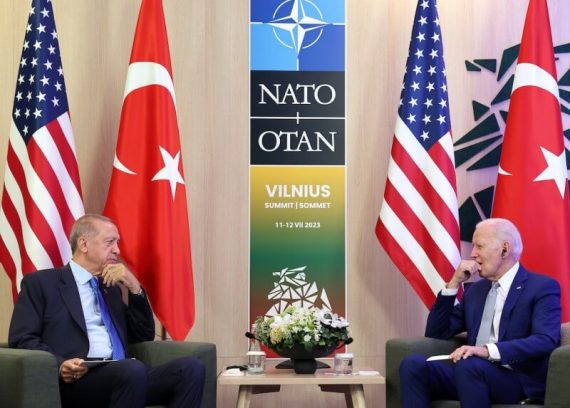T
he first contact in Turkish-U.S. relations began towards the end of the 18th century when the Ottoman Empire and the U.S. established maritime trade relations in Ottoman Mediterranean ports. Despite the interaction in the Mediterranean and the appointment of a U.S. consul in Izmir in 1802, no official relations between the Ottoman Empire and the U.S. were established until the opening of a U.S. embassy in 1831.
Likewise, the Ottomans were slower than European countries in assigning diplomatic missions to the U.S. and the first Ottoman consulate in the U.S. was opened in 1858. Bilateral relations began to deteriorate over time due to the U.S. missionary activities in Ottoman territories, the U.S. policies against the Ottoman Empire in favor of Armenians, and the U.S. reluctance to sell weapons to the Ottoman Empire.
Then, Turkey-U.S. relations were completely severed in World War I when the U.S. declared war against Germany, an ally of the Ottoman Empire. Despite the establishment of the Republic of Turkey in 1923 and the signing of the Treaty of Lausanne, which ended the Armenian and Eastern Questions, and notwithstanding the negotiations and signing of an agreement to restore relations between the two countries, official relations did not commence until February 17, 1927, four years after the establishment of the Republic of Turkey.
The delay in the resumption of diplomatic relations between the newly established republic and the U.S. can be traced to the support of the United States for the Western occupying states and its attitude towards the Treaty of Lausanne after the War of Independence in spite of the U.S. claim to a neutral policy during the war. In this period, Turkey ended its enmity with the states it had opposed in the War of Independence, took advantage of the opportunities offered by peace, and took steps to strengthen its relations with these countries in the course of time.
Strategic approach
The defining approach of Turkish foreign policy was succinctly expressed in the words of Mustafa Kemal Atatürk, the founder of the republic: “Peace at home, peace in the world.” Between 1923 and 1945, the newly established Republic of Turkey adopted a foreign policy based on neutrality and non-alignment that prioritized peace, sovereignty, and national development. Between 1920 and 1955, Turkey pursued a policy of securing its national security through various pacts and declarations of friendship with neighboring countries.
Despite these regional pacts, Turkey, which was not a member of any official organization until 1939, managed to remain independent in its foreign policy and maintain friendly relations with all states. As a continuation of this policy, Turkey refused to enter World War II despite pressure from the Allied powers.
However, the Soviet threat that emerged in the post-World War II era played an important role in the development of Turkish-U.S. relations. The Soviet threat caused the U.S. to abandon its traditional isolationist policy in the bipolar world order and turn to a policy of containment. Moreover, the Soviet Union’s annulment of the Non-Aggression Pact it had signed with Turkey in 1925 and its subsequent demands for military bases in the Turkish Straits and for the possession of Kars and Ardahan in 1945 led Turkey to abandon its traditional policy of neutrality.
These developments are important factors in the evolution of Turkey-U.S. relations and show how the relationship evolved into a strategic partnership. The Truman Doctrine in 1947 highlighted the dangers facing Ankara and sowed the seeds of Turkey’s transatlantic relations. In the same year, Turkey was included in the Marshall Plan, which was designed to utilize U.S. economic aid to reduce Soviet influence in Europe.
Overall, the Soviet Union and security-oriented policies were the common strategic threat linking the U.S. and Turkey during the Cold War. This common threat made Turkey an important Western ally on the southern flank of NATO, and, at the same time, ensured Turkey’s protection from Soviet aggression and played an important role in the U.S. containment policy as a buffer state against the Soviet Union.
Although one of the main reasons for Turkey’s desire to position itself with the West was rooted in security concerns, there were other normative reasons. The pivot towards the West, which began with Westernization and modernization during the Ottoman Empire between 1839 and 1876, continued with reforms after the establishment of the Republic of Turkey and became an important feature of Turkish foreign policy.
After World War II, the ideals of liberal internationalism such as democracy, self-determination, and transnational institutions/organizations were revived by U.S. President Franklin Roosevelt. As a member of many international organizations established as part of this rules-based liberal international order led by the United States, as of 1947, Turkey positioned itself along the line of liberal values and the institutions that supported them.
However, this did not necessarily mean that the strategic partnership continued smoothly during the Cold War. The 1964 Cyprus crisis was a turning point in Turkey-U.S. relations. The letter of then U.S. President Lyndon Johnson admonishing Turkey after Turkey’s involvement in Cyprus led to a questioning of NATO’s support for Turkey and raised serious concerns about the reliability of the alliance with the West.
Developments after 1960 led to a deterioration in Turkey-U.S. relations. These developments included inadequate U.S. military aid; NATO’s adoption of the “flexible response strategy” instead of the “massive retaliation policy,” which had relied on the capacity for a response to the aggressor with nuclear weapons; the withdrawal of Jupiter missiles from Turkey during the Cuban Missile Crisis without consulting the Turkish government; poppy cultivation in Turkey; and Turkey’s eventual 1974 intervention in Cyprus.
With the end of the Cold War, the Truman Doctrine became obsolete, and the disappearance of the common threat raised questions about the future of the relationship. However, the change in the world order did not alter Turkey’s geostrategic importance for the Western alliance. Since the emergence of new centers of conflict and Turkey’s geographical proximity to Iraq, Iran, and the Caucasus made cooperation indispensable in any crisis, strengthening relations with Turkey was again an important security strategy for the United States.
In short, the two countries’ experiences, especially between 1960 and 1980, laid the groundwork for the current mutual mistrust and brought historical concerns to the forefront. On the other hand, although crises and differences of opinion have occasionally caused tensions between the U.S. and Turkey, such temporary crises have never become structural.
In recent years, the gradual decline in U.S. defense support to Turkey, which eventually turned into indirect or direct arms embargoes, forced Turkey to seek alternatives in the defense sector, leading to the purchase of the S400 missile defense system from Russia and the subsequent U.S. imposition of the Countering Adversaries Through Sanctions Act (CAATSA) targeting Turkey’s Defense Industry Directorate. This development led to further friction in bilateral relations.
The U.S. support for Greece’s and the Greek Cypriot Administration of Southern Cyprus’s theses on the Exclusive Economic Zone (EEZ) in the Eastern Mediterranean, the U.S. support for the YPG (the Syrian extension of the PKK in Syria), and the failure to extradite the leader of FETO, who carried out the July 15, 2016 coup attempt, to Turkey are issues that have long been awaiting solution in Turkey-U.S. relations.
Despite strategic mechanisms established between the two countries to resolve some of these disputes, no concrete progress has been made to date. The past has shown that there is always a way for transatlantic partners to make their alliances work, even if such differences sometimes cause cracks that undermine transatlantic solidarity. Given the involvement of both actors in regional and global issues beyond Turkey and U.S. bilateral issues, the war in Ukraine presents an opportunity for the two countries to reconsider their foreign policy approaches and bilateral relations.
Recommended
New System, New Strategy
The new security environment, which emerged with Russia’s invasion of Ukraine, resulted in the U.S. ending its isolation from Europe and a return back to great power rivalry. As Zbigniew Brzezinski explicitly noted in The Grand Chessboard: American Primacy and Its Geostrategic Imperatives (1997), the Eastern Mediterranean and the Black Sea have emerged as the complex region at the center of the return of great power rivalry. Meanwhile, Turkey is located at the center of the most critical region of the war in Ukraine.
This is a development that both increases Turkey’s strategic importance and is an opportunity for both Turkey and the U.S. to abandon old patterns of approaches to foreign policy by thinking with flexibly in a changing international environment, and reconsidering opportunities and alliance relationships accordingly.
The increase in visits and phone calls between Turkish and American officials since the outbreak of the war in Ukraine, and the establishment in October 2022 of a strategic mechanism to reinstate Turkish-U.S. relations on the right track in the aftermath of the Russia-Ukraine War could be interpreted in this context. If the security environment that emerged in the aftermath of the Russia-Ukraine is properly utilized, it may be possible to restore mutual trust.
Since 2018, the U.S. policy of bringing Greece and the Greek Cypriot Administration of Southern Cyprus, which have close relations with Russia, to its side has benefitted the United States. If the U.S. takes an increasingly anti-Turkey stance, this could create issues beyond the current deadlock of existing problems and poison the current positive momentum. At the same time, in the current security environment, which has emerged as a result of Turkey’s efforts to normalize relations with its neighboring countries, Turkey has the potential to improve its relations with its Western allies, which would have a positive impact on Turkish-U.S. relations as well.





